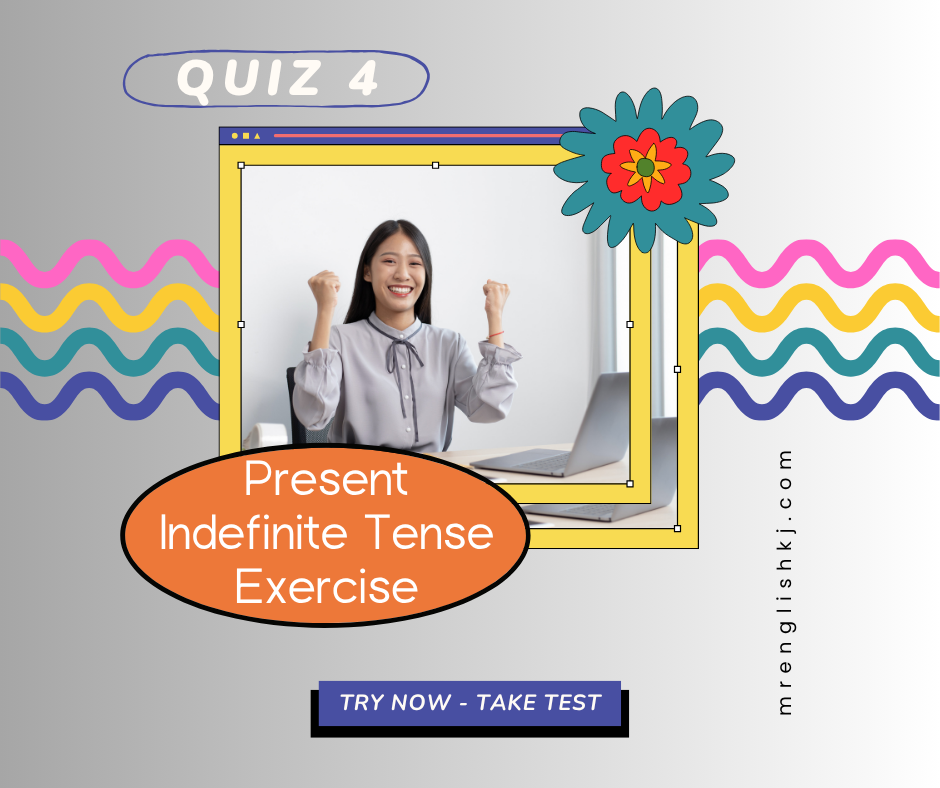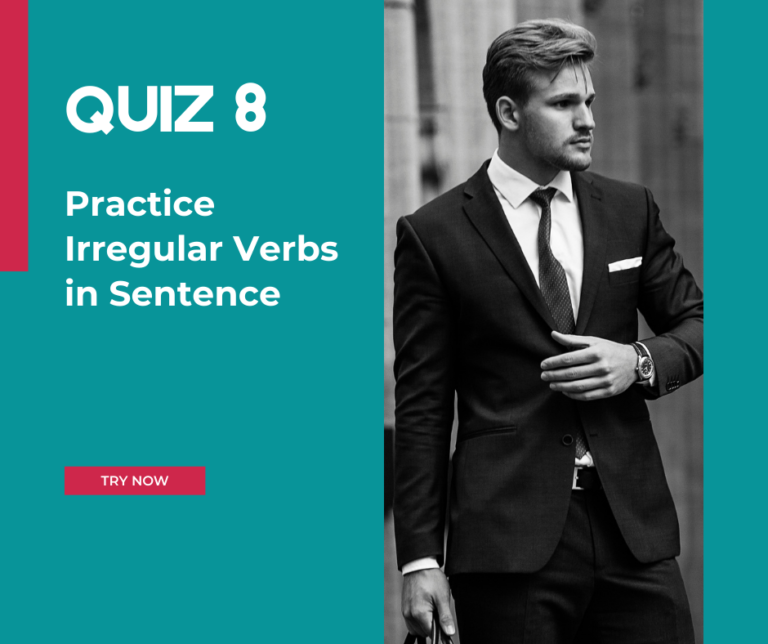
Present Indefinite Exercise 4 — Simple Present Tense Quiz with Useful Daily Vocabulary
Welcome to Present Indefinite — Exercise 4, part of our free English grammar quiz series.
In this set, you’ll practice the Simple Present tense while learning useful daily vocabularies—the kind you actually use when you manage work, decide things, arrange plans, fix problems, and improve skills.
Each question includes four choices, the correct answer, and a short explanation with a definition of the verb so you grow your vocabulary while mastering grammar.
Definition: Present Indefinite (Simple Present)
The Present Indefinite (Simple Present) describes habits, general truths, repeated actions, scheduled events, and states.
- Formation: base verb, verb 1st form, for I/you/we/they (e.g., I walk, they eat).
- Third person singular (he/she/it): add -s or -es on base verb (e.g., he walks, she goes).
- Use “do/does + verb 1st form” in negatives and questions.
- Use with adverbs of frequency: always, usually, often, sometimes, never.
- To learn more about Present Indefinite Tense – Visit Here
Quiz Instructions
- Read each question and choose the best answer out of four given options.
- On top, header section of the quiz, you will see the “title of the quiz,’ ‘spending-time,’ ‘value of question in points,’ and ‘number of questions.”
- Below on footer, you will see Full Screen mode. As the name suggests, it covers the whole screen. It will save a lot of your time attempting the quiz.
- You can zoom the images given in the questions.
- After submitting the quiz, you can see your score and compare with other users.
- The Full Leaderboard link will take you to a page, where you can see all users attempts.
- Below the quiz box, there are explanation of each options. You can study and try again.
- Best of Luck!
Quiz Question, Answer and Explanation
Note: Do remember in the quiz box above, the questions and options will shuffle, so they won’t have the same sequence like 1, 2, 3, or A, B, C as below.
1. He __ his time carefully every morning.
A) manage B) manages C) managing D) managed
Verb “manage” = to organize or control something effectively.
✅ Correct: B) manages
Why correct: Subject He (3rd singular) requires manages (add -s).
Why others are wrong:
A) manage — base form; wrong for 3rd person singular in simple present.
C) managing — present participle/gerund, not the simple present finite form.
D) managed — past tense, not present.
2. They __ their meetings online.
A) arrange B) arranges C) arranging D) arranged
Verb “arrange” = to plan or organize an event or activity.
Correct: A) arrange
Why correct: They (plural) + base verb arrange.
Why others are wrong:
B) arranges — -s form for 3rd person singular; incorrect with they.
C) arranging — progressive/participle form, not simple present.
D) arranged — past tense.
3. My father __ our family budget every month.
A) prepare B) prepares C) preparing D) prepared
Verb “prepare” = to make ready or plan ahead.
✅ Correct: B) prepares
Why correct: My father = he → 3rd person singular → prepares.
Why others are wrong:
A) prepare — base form, wrong with he.
C) preparing — -ing form (not simple present).
D) prepared — past tense.
4. We usually ______ new ideas during lunch.
A) discuss B) discusses C) discussed D) discussing
Verb definition: discuss = to talk about to reach understanding.
Correct: A) discuss
Why correct: We uses base verb discuss for habitual action.
Why others are wrong:
B) discusses — 3rd singular form, wrong for we.
C) discussed — past tense.
D) discussing — participle, not simple present finite.
5. She ______ her mistakes quickly.
A) realize B) realizes C) realized D) realizing
Verb definition: realize = to become aware; to understand.
Correct: B) realizes
Why correct: She → 3rd person singular → realizes.
Why others are wrong:
A) realize — base form, wrong with she.
C) realized — past tense.
D) realizing — -ing form.
6. I always ______ a solution instead of complaining.
A) find B) finds C) found D) finding
Verb definition: find = to discover or obtain.
Correct: A) find
Why correct: I uses base verb find.
Why others are wrong:
B) finds — 3rd person singular, wrong with I.
C) found — past tense.
D) finding — participle.
7. The company ______ all emails within 24 hours.
A) reply B) replies C) replied D) replying
Verb definition: reply = to answer a message.
Correct: B) replies
Why correct: Company (singular ‘it’) → replies (note -ies after consonant + y).
Why others are wrong:
A) reply — base form, wrong for singular company without auxiliary.
C) replied — past tense.
D) replying — -ing form.
8. You ______ very clearly during presentations.
A) express B) expresses C) expressed D) expressing
Verb definition: express = to convey thoughts/feelings in words.
Correct: A) express
Why correct: You uses base form express.
Why others are wrong:
B) expresses — 3rd singular; wrong for you.
C) expressed — past tense.
D) expressing — participle.
9. He ______ his phone every morning before work.
A) charge B) charges C) charged D) charging
Verb definition: charge = to put electricity into a device.
Correct: B) charges
Why correct: He → charges (3rd person).
Why others are wrong:
A) charge — base form; wrong for he.
C) charged — past.
D) charging — -ing.
10. We ______ the news from reliable sources.
A) receive B) receives C) received D) receiving
Verb definition: receive = to get something sent or given to you.
Correct: A) receive
Why correct: We + base verb receive for habitual action.
Why others are wrong:
B) receives — 3rd singular form.
C) received — past.
D) receiving — -ing.


